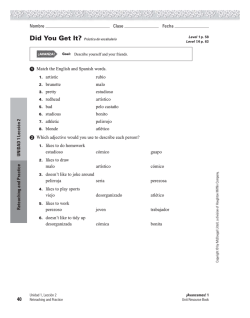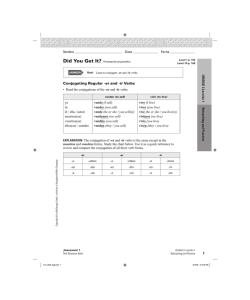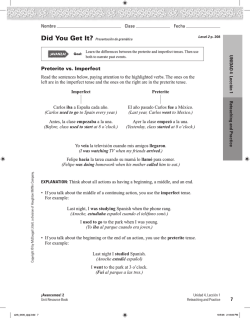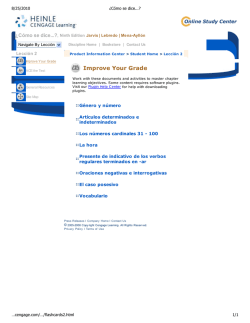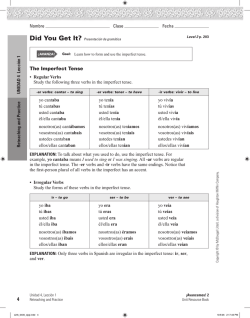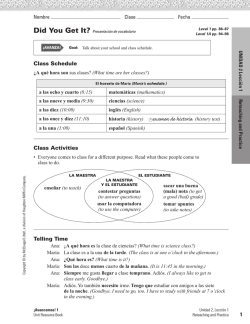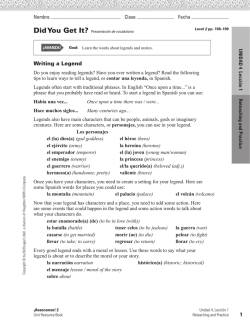
Did You Get It? Presentación de gramática
Nombre Clase Did You Get It? ¡AVANZA! Goal: Fecha Presentación de vocabulario Level 2 pp. 144–145 Talk about clothes and shopping. Say where you shop and express opinions. UNIDAD 3 Lección 1 Clothing • Study the words that are used to talk about clothing and the way they fit. vestirse (to get dressed) las botas (boots) las sandalias (sandals) el suéter (sweater) la pulsera (bracelet) el traje (suit) la falda (skirt) la talla (clothing size) el cinturón (belt) el reloj (watch) de cuadros (plaid) de rayas (striped) Reteaching and Practice Copyright © by McDougal Littell, a division of Houghton Mifflin Company. Clothes Places to shop la joyería (jewelry store) la farmacia (pharmacy) Internet (Internet) la zapatería (shoe store) la librería (bookstore) la panadería (bakery) • Read the following conversation to learn some words and expressions you can use to talk about clothes. —¿Cómo me queda esta falda? (How does this skirt fit me?) ¡Me encanta! (I love it!) —En mi opinión (In my opinion), te queda apretada (tight). Es mala idea (It’s a bad idea) comprarla. —¿Estos jeans me quedan bien o flojos (loose)? —Te quedan bien. Es buena idea comprarlos. (It’s a good idea . . . ) —Creo que sí. (I think so.) —¿Podrías recomendarme una zapatería? (Could you recommend to me . . . ) —La Zapatería González es buena. Allí venden zapatos que están de moda (are fashionable). —¿Está abierta ahora? (Is it open now?) —No, ahora está cerrada. (No, it’s closed now.) ¡Avancemos! 2 Unit Resource Book Unidad 3, Lección 1 Reteaching and Practice 1 Nombre Clase Did You Get It? Goal: Level 2 p. 146 Práctica de vocabulario Talk about clothes and shopping. Say where you shop and express opinions. 1. 2. 3. 4. 5. 6. 7. 8. 1. 5. 2. 6. 3. 7. 4. 8. 2 Where do you go to buy the following? 1. los zapatos: la panadería la zapatería la farmacia 2. una pulsera: la farmacia la joyería la librería 3. el pan: la panadería la farmacia la zapatería 4. un libro: la zapatería la joyería la librería 5. la medicina: la librería la farmacia la panadería 3 Where is everyone? Follow the model. Modelo: 2 Alisa está comprando champú. 1. Tomás está comprando botas. 2. Las chicas están comprando joyas. 3. Tú estás comprando (el) pan. 4. Arturo y yo estamos comprando libros. 5. Yo estoy comprando un reloj. Unidad 3, Lección 1 Reteaching and Practice Ella está en la farmacia. ¡Avancemos! 2 Unit Resource Book Copyright © by McDougal Littell, a division of Houghton Mifflin Company. 1 Write the word for the item shown in each picture. Reteaching and Practice UNIDAD 3 Lección 1 ¡AVANZA! Fecha Nombre Clase Fecha 4 Choose the best expression to describe how everything fits based on the description. 2. 3. 4. 6. b. Le queda floja. Las botas son el número correcto. a. Le quedan bien. b. Le quedan apretadas. La pulsera es muy grande. a. Le queda bien. b. Le queda mal. El suéter no es grande ni es pequeño. a. Le queda apretado. b. Le queda bien. El traje es la talla correcta. a. Le queda bien. b. Le queda flojo. Los zapatos son pequeños. a. Le quedan apretados. b. Le quedan flojos. Reteaching and Practice 5. La pulsera es muy grande. a. Le queda bien. UNIDAD 3 Lección 1 1. Copyright © by McDougal Littell, a division of Houghton Mifflin Company. 5 Choose the correct word or phrase to complete the conversation. de moda recomiendas buena idea apretada opinión creo queda bien me parece que Alma: ¿Es ir de compras hoy? Migdalia: ¡ que sí! Alma: A mí me gusta vestirme con la ropa que está . Migdalia: A mí también. Pero en mi es mala idea vestirte con ropa de moda si no te . Alma: Bueno, ¿cómo me queda esta falda negra? Migdalia: es demasiado pequeña. Alma: Es verdad. Me queda un poco . ¿Y esta falda marrón? Migdalia: Esa falda te queda bien. Alma: ¿Y ésta verde? Migdalia: También te queda bien. Alma: ¿Cuál me , la falda marrón o la falda verde? Migdalia: Las dos. ¡Compra las dos! 6 Answer the following questions in complete sentences in Spanish. 1. ¿Dónde compras botas? 2. ¿Qué número de zapatos necesitas? 3. ¿Te gusta vestirte con ropa que está de moda? 4. ¿Cómo te queda tu ropa favorita? ¡Avancemos! 2 Unit Resource Book Unidad 3, Lección 1 Reteaching and Practice 3 Nombre Clase Did You Get It? Goal: Level 2 p. 149 Presentación de gramática Learn about the irregular yo forms of some present-tense verbs. Irregular yo Verbs • Study the conjugation of the following verbs. hacer (to do/to make) poner (to put) salir (to go out/to leave) traer (to bring) yo hago pongo salgo traigo tú haces pones sales traes EXPLANATION: The verbs hacer, poner, salir, and traer end in -go in the yo form. Compare them with their tú forms in the present tense. • Now study the conjugation of these verbs. decir (to say) venir (to come) tener (to have) yo digo vengo tengo tú dices vienes tienes EXPLANATION: The verbs decir, venir, and tener also end in -go in the yo form. All are stem-changing verbs, but only decir changes the stem vowel in the yo form. • Finally, study the conjugation of these verbs. conocer (to know/to meet) dar (to give) saber (to know) ver (to see) yo conozco doy sé veo tú conoces das sabes ves EXPLANATION: Conocer, dar, saber, and ver also have irregular yo forms in the present tense. 4 Unidad 3, Lección 1 Reteaching and Practice ¡Avancemos! 2 Unit Resource Book Copyright © by McDougal Littell, a division of Houghton Mifflin Company. Reteaching and Practice UNIDAD 3 Lección 1 ¡AVANZA! Fecha Nombre Clase Did You Get It? ¡AVANZA! Goal: Fecha Level 2 pp. 150–151 Práctica de gramática Learn about the irregular yo forms of some present-tense verbs. UNIDAD 3 Lección 1 1 Write the correct yo form of each verb. tener 7. decir 2. ver 8. conocer 3. saber 9. venir 4. traer 10. dar 5. poner 11. salir 6. hacer Reteaching and Practice 1. Copyright © by McDougal Littell, a division of Houghton Mifflin Company. 2 Complete each sentence with the correct form of the verb in parentheses. 1. Yo no 2. Siempre me zapatos cómodos. (poner) 3. Tú también francés. (saber) 4. Yo todas las librerías. (conocer) 5. ¿Tú que es buena idea? (decir) 6. Yo 7. Yo te 8. ¿ 9. Yo 10. ¿ clases esta semana. (tener) las sandalias a la playa. (traer) un regalo. (dar) tú la tarea? (hacer) con mis amigos. (salir) tú ese programa de televisión? (ver) 3 Answer yes to the following questions. Follow the model. Modelo: ¿Tienes que comprar un traje? 1. ¿Siempre vienes a este café? 2. ¿Siempre dices la verdad? 3. ¿Pones la mesa para la cena? 4. ¿Conoces a los estudiantes? 5. ¿Haces compras por Internet? 6. ¿Sales con tus amigos hoy? 7. ¿Traes el pastel a la fiesta? 8. ¿Le das un regalo a tu amiga? 9. ¿Ves todas las películas nuevas? ¡Avancemos! 2 Unit Resource Book Si, tengo que comprar un traje. Unidad 3, Lección 1 Reteaching and Practice 5 Nombre Clase Fecha 1. ¿Vienes tarde a la escuela? 2. ¿Haces la cama antes de salir de casa? 3. ¿Sales con tus amigos después de clases? 4. ¿Le das un regalo a tu amigo para su cumpleaños? 5. ¿Conoces tiendas donde venden ropa que está de moda? 6. ¿Les dices siempre la verdad a tus padres? 7. ¿Te pones el uniforme para jugar al béisbol? 8. ¿Sabes todos los secretos de tu mejor amigo(a)? Copyright © by McDougal Littell, a division of Houghton Mifflin Company. Reteaching and Practice UNIDAD 3 Lección 1 4 Answer the questions in complete sentences based on your own experience. 5 Translate the following. 6 1. I buy things on the Internet. 2. I have a new skirt. 3. I put the skirt on before putting the blouse on. 4. I give gifts to my friends. 5. I bring my books to class. 6. I watch funny movies. Unidad 3, Lección 1 Reteaching and Practice ¡Avancemos! 2 Unit Resource Book Nombre Clase Did You Get It? ¡AVANZA! Goal: Fecha Level 2 p. 154 Presentación de gramática Learn the pronouns that follow prepositions. UNIDAD 3 Lección 1 Pronouns After Prepositions • Read the following sentences, paying attention to the boldfaced words. EXPLANATION: Pronouns that follow prepositions are different from subject pronouns and object pronouns. You can use the pronouns listed above after prepositions such as para, de, a, and con. • Read these sentences, paying attention to the boldfaced words. Reteaching and Practice La pulsera es para mí. (The bracelet is for me.) La zapatería está delante de ti. (The shoe store is in front of you.) Las botas están junto a él. (The boots are next to him.) Tenemos las compras con nosotros. (We have the purchases with us.) La casa está lejos de ustedes. (The house is far from you.) Los regalos son para usted. (The gifts are for you.) Copyright © by McDougal Littell, a division of Houghton Mifflin Company. ¿Vas conmigo a la zapatería? (Are you going with me to the shoe store?) Sí, voy contigo. (Yes, I’m going with you.) EXPLANATION: When you use mí and ti after the preposition con, they form the words conmigo and contigo. • Read the following sentences, paying attention to the highlighted words. A mí no me gusta comprar por Internet. (I don’t like buying on the Internet.) A él no le gusta la ropa de cuadros. (He doesn’t like plaid clothes.) EXPLANATION: With verbs like gustar, you can use pronouns after a to add emphasis. • Read these sentences, paying attention to the boldfaced words. No le gusta la ropa apretada. (He/she/you don’t like tight clothes.) A ella no le gusta la ropa apretada. (She doesn’t like tight clothes.) Le regalaron un traje marrón. A él le regalaron un traje marrón. (They gave him/her/you a brown suit as a gift.) (They gave him a brown suit as a gift.) EXPLANATION: The pronoun after a also can clarify to whom the sentence refers. ¡Avancemos! 2 Unit Resource Book Unidad 3, Lección 1 Reteaching and Practice 7 Nombre Clase Did You Get It? Goal: Level 2 pp. 155–156 Práctica de gramática Learn the pronouns that follow prepositions. 1 Complete the sentences. nosotros él ella mí ellas 1. Es de 2. Está al lado de 3. La ropa es de . (The clothes are his.) 4. Quiero ir con . (I want to go with them.) 5. Los niños están con 6. La pulsera es para ti . (It’s hers.) . (It’s beside you.) . (The children are with us.) . (The bracelet is for me.) 2 Write each tag in Spanish. 1. 2. 3. 4. 1. Para 4. Para 2. Para 5. Para 3. Para 5. 3 Complete the translations clarifying to whom each sentence refers. Follow the model. Modelo: 8 She likes jewelry. A ella le gustan las joyas. 1. I like to go to the bookstore. 2. Do you like the suit? ¿ 3. We like music. 4. They don’t like to go shopping. 5. He likes all the boots. Unidad 3, Lección 1 Reteaching and Practice me gusta ir a la librería. te gusta el traje? nos gusta la música. no les gusta ir de compras. le gustan todas las botas. ¡Avancemos! 2 Unit Resource Book Copyright © by McDougal Littell, a division of Houghton Mifflin Company. Reteaching and Practice UNIDAD 3 Lección 1 ¡AVANZA! Fecha Nombre Clase Fecha 4 Answer the following questions, using one of these verbs in your answer: gustar, ¿A ti te gusta comprar por Internet? 2. ¿A ti te gusta la ropa que está de moda? 3. ¿A ti te gustan los trajes apretados? 4. ¿A ti te gusta ir a la librería? 5. ¿A ti te gusta la clase de español? Reteaching and Practice 1. UNIDAD 3 Lección 1 encantar, importar, and interesar. Follow the model. Modelo: —¿A ti te gusta hacer compras en la zapatería? —Sí, a mí me encanta hacer compras en la zapatería. Copyright © by McDougal Littell, a division of Houghton Mifflin Company. 5 Translate the following sentences. 1. My mother is going shopping with me. 2. We want to buy these boots for you. 3. You don’t like this skirt. 4. José, can I go with you? 5. The jewelry store is in front of us! 6. I really love the bracelet! ¡Avancemos! 2 Unit Resource Book Unidad 3, Lección 1 Reteaching and Practice 9 Nombre Clase Fecha Level 2 p. 153 ¿Recuerdas? UNIDAD 3 Lección 1 • Study the following expressions of frequency in Spanish. Reteaching and Practice Expressions of frequency Práctica siempre (always) nunca (never) todos los días (every day) de vez en cuando (once in a while) 1 Choose the most logical response to each statement. A Pedro no le gusta hacer ejercicio. a. 2. Nunca va a la joyería. b. Siempre va a la joyería. Voy a la zapatería de vez en cuando. b. Nunca voy a la zapatería. b. Siempre compras ropa nueva. b. Siempre llevo un gorro. A ti no te interesa la ropa que está de moda. a. 5. Nunca va al gimnasio. A mí me gusta comprar zapatos. a. 4. b. A Lola le encantan las joyas. a. 3. Va al gimnasio todos los días. Nunca compras ropa nueva. A mí me molesta llevar una gorra. a. Llevo un gorro sólo de vez en cuando. 2 Tell how often you do the following. Use siempre, nunca, todos los días, or de vez en cuando. 1. dar fiestas 2. ir a la biblioteca 3. comprar por Internet 4. ver películas de horror 5. estudiar español 6. comprar ropa 7. leer novelas 8. hacer la tarea 9. escribir poesía 10. 10 sacar buenas notas Unidad 3, Lección 1 Reteaching and Practice ¡Avancemos! 2 Unit Resource Book Copyright © by McDougal Littell, a division of Houghton Mifflin Company. 1. Nombre Clase Fecha Level 2 p. 150 ¿Recuerdas? Clothes Clothes UNIDAD 3 Lección 1 • Study the following words we use to talk about clothes. Reteaching and Practice el gorro (winter hat) el sombrero (hat) la ropa (clothing) la camisa (shirt) la camiseta (T-shirt) la chaqueta (jacket) los jeans (jeans) los pantalones (pants) los pantalones cortos (shorts) las botas (boots) Putting on clothes ponerse la ropa (to put clothes on) vestirse (to get dressed) Copyright © by McDougal Littell, a division of Houghton Mifflin Company. Práctica What do they wear and when? Form sentences with the words given. Follow the model. Modelo: Elena / ponerse pantalones cortos / cuando hace calor Ella se pone pantalones cortos cuando hace calor. 1. yo / ponerse una camiseta / en el verano 2. ellos / ponerse los jeans / cuando hace frío 3. Alejandro y yo / ponerse un sombrero / cuando hace sol 4. tú / ponerse una chaqueta / cuando hace viento 5. Luis y Javier / ponerse las botas / cuando nieva 6. ustedes / ponerse los pantalones cortos / cuando hace mucho sol ¡Avancemos! 2 Unit Resource Book Unidad 3, Lección 1 Reteaching and Practice 11 Nombre Clase Did You Get It? Goal: Level 2 pp. 168–169 Talk about items at a marketplace, and learn to use polite expressions. Items at a Marketplace • Below is a list of words used to describe items you might find at a marketplace. Study the words. Items el retrato (portrait) la pintura (painting) la escultura (sculpture) los artículos (goods) una ganga (a bargain) los artículos (goods) Descriptions hecho(s) a mano (hand-made) de plata (of silver) de cuero (of leather) de oro (of gold) de metal (of metal) de cerámica (of ceramic) de madera (of wood) de piedra (of stone) fino(a) (fine) único(a) (unique) barato(a) (inexpensive) Expressions of Courtesy • Read the ways to address people politely. Gracias. (Thank you.) De nada. (You’re welcome.) Con permiso. (Excuse me.) Pase. (Go ahead.) Perdóneme. (I’m sorry.) Disculpe. (Excuse me. / I’m sorry . . . ) ¿Puedo ver... ? ¿Podría mostrarme... ? ¿Me deja ver... ? (May I see . . . ?) Con mucho gusto. (With pleasure.) 12 Unidad 3, Lección 2 Reteaching and Practice ¡Avancemos! 2 Unit Resource Book Copyright © by McDougal Littell, a division of Houghton Mifflin Company. Reteaching and Practice UNIDAD 3 Lección 2 ¡AVANZA! Presentación de vocabulario Fecha Nombre Clase Did You Get It? ¡AVANZA! Goal: Fecha Level 2 p. 170 Práctica de vocabulario Talk about items at a marketplace, and learn to use polite expressions. UNIDAD 3 Lección 2 1 What is . . . ? 1. a good purchase at a cheap price? una escultura 2. una escultura única un artículo caro un artículo barato un artículo de oro un artículo de plata una pintura una escultura Reteaching and Practice una escultura fina an article made out of gold? un artículo hecho a mano 6. un artículo an article made by hand? un artículo hecho a mano 5. una escultura a unique sculpture? una escultura barata 4. un retrato a painting of a person? un retrato 3. una ganga a painting? un artículo Copyright © by McDougal Littell, a division of Houghton Mifflin Company. 2 Write the most logical choice to complete each dialogue. Use each expression from the box only once. Sí, son muy finas. Con mucho gusto. 1. Es de metal. Pase, por favor. ¿Puedo entrar? De nada. —¿ Puedo ver esa escultura? — 2. —¿De qué es la escultura? — 3. —Nos gustaría ver el retrato. — 4. — —Sí, pase. 5. —Las joyas son muy originales. — 6. —Gracias. — ¡Avancemos! 2 Unit Resource Book Unidad 3, Lección 2 Reteaching and Practice 13 Nombre Clase Fecha 1. a gold necklace un collar 2. a fine bracelet una pulsera 3. a unique sculpture una escultura 4. a hand-made hat un sombrero 5. a silver ring un anillo 6. inexpensive shoes unos zapatos 7. What a bargain! ¡Qué 8. a stone sculpture una escultura 9. a beautiful portrait un wooden goods los artículos 10. ! bello. 4 Imagine that you are at an open-air market. What do you say if . . . ? 1. you want to see a painting? 2. you want to see a stone sculpture? 3. you want to know if a bracelet is made of gold? 4. you want to say “you’re welcome”? 5. you bump into someone? 6. you want to tell the vendor that you are looking for inexpensive items? 5 Write a complete sentence describing two things you bought recently at a market and what each was made of. 14 Unidad 3, Lección 2 Reteaching and Practice ¡Avancemos! 2 Unit Resource Book Copyright © by McDougal Littell, a division of Houghton Mifflin Company. Reteaching and Practice UNIDAD 3 Lección 2 3 Complete the following translations. Nombre Clase Did You Get It? ¡AVANZA! Goal: Fecha Level 2 p. 173 Presentación de gramática Learn five verbs with irregular preterite stems. UNIDAD 3 Lección 2 Irregular Verbs in the Preterite • Study the following verbs, stems, and preterite endings. Stem Preterite Endings estar (to be) poder (to be able) poner (to put) saber (to know) tener (to have) estuvpudpussuptuv- -e -iste -o -imos -isteis -ieron EXPLANATION: The Spanish verbs estar, poder, poner, saber and tener are irregular in the preterite tense. To form the preterite of these verbs, you need to change their stems and add irregular preterite endings. Reteaching and Practice Verb • Read the following sentence, paying attention to the boldfaced verb. Copyright © by McDougal Littell, a division of Houghton Mifflin Company. Yo supe la respuesta esta mañana. (I found out the answer this morning.) EXPLANATION: The verb saber has a different meaning in the preterite. It means to find out. ¡Avancemos! 2 Unit Resource Book Unidad 3, Lección 2 Reteaching and Practice 15 Nombre Clase Did You Get It? Goal: Level 2 pp. 174–175 Práctica de gramática Learn five verbs with irregular preterite stems. 1 Write the correct form of the following verbs in the preterite. 1. estar yo ustedes / ellos tú Ariana y yo usted 2. tener Ana y Luisa nosotros ella tú yo 3. poner usted yo Rodrigo y yo ustedes él 4. poder tú Emiliana los chicos usted nosotras 5. tener Lorenzo y Pablo yo Andrea, Alicia y yo ellas ustedes Copyright © by McDougal Littell, a division of Houghton Mifflin Company. Reteaching and Practice UNIDAD 3 Lección 2 ¡AVANZA! Fecha 2 Write the following in Spanish in the preterite. 16 1. you (pl.) were 6. the boys were 2. they could 7. we put 3. we found out 8. you ( pl.) had 4. Lorenzo and Lupe put 9. I found out 5. Patricia had Unidad 3, Lección 2 Reteaching and Practice 10. you (familiar, sing.) could ¡Avancemos! 2 Unit Resource Book Nombre Clase Fecha 3 Complete the paragraph with the correct form of estar, poder, poner, saber, and tener. Copyright © by McDougal Littell, a division of Houghton Mifflin Company. 1. She was here yesterday. 2. They found out the truth last week. 3. We had it last year. 4. Mr. Sánchez put it there yesterday. 5. You finally were able to write the e-mail. 6. I found out now. 7. They were here last week. 8. He had it last month. 9. They were able to go on Tuesday. 10. Reteaching and Practice 4 Translate the sentences into Spanish. UNIDAD 3 Lección 2 Ayer Anastasia y yo 1. en el mercado de artesanías. Nosotros 2. que en el mercado hay muchas gangas. Vimos muchas cosas bonitas en el mercado. Yo compré unas botas de cuero baratas. Anastasia compró una pulsera bonita. Nosotros no 3. pagar con tarjeta de crédito. 4. que pagar con dinero en efectivo. Cuando salimos del mercado yo me 5. las botas y ella se 6. la pulsera. She finally put on the boots. ¡Avancemos! 2 Unit Resource Book Unidad 3, Lección 2 Reteaching and Practice 17 Nombre Clase Did You Get It? Reteaching and Practice UNIDAD 3 Lección 2 ¡AVANZA! Goal: Fecha Level 2 p. 178 Presentación de gramática Understand the preterite forms of -ir stem changing verbs. Preterite Tense of -ir Stem Changing Verbs • Read the conjugation of pedir and dormir in the preterite. Preterite tense e i Preterite tense o pedir (to ask for) pedí pediste pidió pedimos pedisteis pidieron u dormir (to sleep) dormí dormiste durmió dormimos dormisteis durmieron EXPLANATION: Many -ir verbs have stem changes in the present tense. These verbs change stems in some forms of the preterite tense, too. Stem-changing -ir verbs in the preterite change only in the usted/él/ella and the ustedes/ellos/ellas forms. seguir (to follow) 18 preferir (to prefer) vestirse (to get dressed) servir (to serve) competir (to compete) seguí seguiste siguió preferí preferiste prefirió me vestí te vestiste se vistió serví serviste sirvió competí competiste compitió seguimos seguisteis siguieron preferimos preferisteis prefirieron nos vestimos os vestisteis se vistieron servimos servisteis sirvieron competimos competisteis compitieron Unidad 3, Lección 2 Reteaching and Practice ¡Avancemos! 2 Unit Resource Book Copyright © by McDougal Littell, a division of Houghton Mifflin Company. There are other Spanish verbs that follow the pattern of pedir. Read the chart below, paying attention to the underlined letters. Nombre Clase Did You Get It? ¡AVANZA! Goal: Fecha Level 2 pp. 179–180 Práctica de gramática Understand the preterite forms of -ir stem changing verbs. UNIDAD 3 Lección 2 1 Write the correct form of the following verbs in the preterite. 1. pedir yo ellas usted 2. dormir Ana y Luisa Reteaching and Practice nosotros tú 3. seguir tú ustedes él 4. preferir tú Emiliana las chicas 5. servir Lucía y yo Copyright © by McDougal Littell, a division of Houghton Mifflin Company. Alicia ellos 6. vestirse nosotras los estudiantes tú 2 Write the correct preterite form for the verb in parentheses. 1. Carolina 2. Mi hermano 3. Nosotros 4. Ustedes 5. El camarero nos 6. Ustedes 7. ¿ 8. Nosotros 9. Los chicos hamburguesas. (pedir) 10. ¿Qué libro tu hermano? (prefer) ¡Avancemos! 2 Unit Resource Book un sándwich. (pedir) en la maratón. (competir) toda la mañana. (dormir) las instrucciones. (seguir) la comida. (servir) el menú. (pedir) ustedes en el campeonato? (competir) rápido. (vestirse) Unidad 3, Lección 2 Reteaching and Practice 19 Nombre Clase Fecha 3 Use the appropriate preterite and present tense forms to complete each set of Reteaching and Practice UNIDAD 3 Lección 2 sentences. 1. 2. 3. 4. 5. dormir Ayer tú Hoy tú poco. mucho. competir La semana pasada ellos Esta semana ellos en el gimnasio. en el estadio. seguir El año pasado, tú Este año, tú no la moda. la moda. pedir El mes pasado usted Ahora, usted vestirse Anteayer usted Hoy usted un collar de plata. un collar de oro. antes de desayunar. después de desayunar. 20 1. They ordered pizza. 2. I got dressed early today. 3. You served a good dinner. 4. Emiliana slept eight hours. 5. My friends competed in the championship. 6. She preferred to go to the movies. 7. We followed the lesson. 8. The waiter served a cold soup. Unidad 3, Lección 2 Reteaching and Practice Copyright © by McDougal Littell, a division of Houghton Mifflin Company. 4 Translate the following sentences into Spanish. ¡Avancemos! 2 Unit Resource Book Nombre Clase Fecha Level 2 p. 175 ¿Recuerdas? Family Members and Chores la hija (daughter) la abuela (grandmother) la tía (aunt) la prima (female cousin) el hijo (son) el abuelo (grandfather) el tío (uncle) el primo (male cousin) los padres (parents) los hermanos (brothers and sisters) los hijos (children) los abuelos (grandparents) los tíos (aunts and uncles) los primos (cousins) • You also have learned words about chores. Review these. Copyright © by McDougal Littell, a division of Houghton Mifflin Company. hacer la cama (to make the bed) barrer el suelo (to sweep the floor) cortar el césped (to cut the grass) poner la mesa (to set the table) Los quehaceres (chores) lavar los platos (to wash the dishes) sacar la basura (to take out the trash) pasar la aspiradora (to vacuum) limpiar la cocina (to clean the kitchen) Reteaching and Practice la madre (la mamá) (mother, mom) la hermana (sister) La familia (family) el padre (el papá) (father, dad) el hermano (brother) UNIDAD 3 Lección 2 • You have learned many words to talk about family members. Review these. Práctica Which family members had to do the following chores? Follow the model. Modelo: my grandmother / set the table Mi abuela tuvo que poner la mesa. 1. my mom / sweep the floor 2. my sisters / do the dishes 3. my grandfather / cut the grass 4. my brother and I / clean the kitchen 5. I / take out the garbage ¡Avancemos! 2 Unit Resource Book Unidad 3, Lección 2 Reteaching and Practice 21 Nombre Clase Fecha Level 2 p. 179 ¿Recuerdas? • You already have learned words about food. Read and review the list below. el pescado (fish) el pollo (chicken) las uvas (grapes) la sopa (soup) el pastel (cake) la leche (milk) el arroz (rice) la ensalada (salad) la hamburguesa (hamburger) el pan (bread) la pizza (pizza) el tomate (tomato) Práctica 1 Match the following. 1. el pescado a. hamburger 2. el pollo b. rice 3. las uvas c. soup 4. la sopa d. fish 5. el pastel e. milk 6. la ensalada f. chicken 7. la hamburguesa g. grapes 8. el pan h. bread 9. la leche i. cake 10. el arroz j. salad 2 Think about the last time you went to a restaurant. Use the verb pedir to write three or four sentences describing what you and others ordered. Follow the model. Modelo: La última vez que fui a un restaurante yo pedí una hamburguesa con queso. Mi mamá pidió una ensalada. Mi papá pidió pescado. Mis hermanos pidieron una pizza. 22 Unidad 3, Lección 2 Reteaching and Practice ¡Avancemos! 2 Unit Resource Book Copyright © by McDougal Littell, a division of Houghton Mifflin Company. Reteaching and Practice UNIDAD 3 Lección 2 Foods Did You Get It? Answer Key PRÁCTICA DE VOCABULARIO 4 1. 1 2. 1. 2. 3. 4. 5. 7. 8. 2 3. 4. 5. 6. 5 buena idea, Creo, de moda, opinión, queda bien, Me parece que, apretada, recomiendas 6 Answers may vary. 1. 1. 2. 3. 4. 5. la zapatería la joyería la panadería la librería la farmacia 2. 3. 4. Compro botas (Las compro) en la zapatería. Necesito el número... Sí, me gusta vestirme con ropa que está de moda. Mi ropa favorita me queda bien. Reteaching and Practice Answer Key 6. los zapatos el reloj la pulsera el cinturón la falda la sandalia el suéter las botas b a b b a a UNIDAD 3 Lección 1 CLOTHES AND SHOPPING, pp. 2–3 3 Copyright © by McDougal Littell, a division of Houghton Mifflin Company. 1. 2. 3. 4. 5. Él está en la zapatería. Ellas están en la joyería. Yo estoy (Tú estás) en la panadería. Ustedes están (Nosotros estamos) en la librería. Tú estás (Yo estoy) en la joyería. ¡Avancemos! 2 Unit Resource Book Unidad 3, Lección 1 Reteaching and Practice Answer Key 23 Did You Get It? Answer Key 4 IRREGULAR YO VERBS, pp. 5, 6 1. 1 2. 1. 2. 3. 4. 5. 6. 7. 8. 9. 10. 11. tengo veo sé traigo pongo hago digo conozco vengo doy salgo 2 3. 4. 5. 6. 7. 8. 5 1. 1. 2. 3. 4. 5. 6. 7. 8. 9. 10. tengo pongo sabes conozco dices traigo doy Haces salgo Ves Sí, (No, no) vengo tarde a la escuela. Sí, (No, no) hago la cama antes de salir. Sí, (No, no) salgo con mis amigos después de clases. Sí, (No, no) le doy un regalo a mi amigo para su cumpleaños. Sí, (No, no) conozco tiendas donde venden ropa que está de moda. Sí, (No, no) les digo siempre la verdad. Sí, (No, no) me pongo el uniforme para jugar al béisbol. Sí, (No, no) sé todos los secretos de mi mejor amigo(a). 2. 3. 4. 5. 6. Hago compras por Internet. Tengo una falda nueva. Me pongo la falda antes de ponerme la blusa. Les doy regalos a mis amigos. Traigo mis libros a clase. Veo películas cómicas. 3 1. 2. 3. 4. 5. 6. 7. 8. 9. 24 Sí, siempre vengo a este café. Sí, siempre digo la verdad. Sí, pongo la mesa para la cena. Sí, conozco a los estudiantes. Sí, hago compras por Internet. Sí, salgo con mis amigos hoy. Sí, traigo el pastel a la fiesta. Sí, le doy un regalo a mi amiga. Sí, veo todas las películas nuevas. Unidad 3, Lección 1 Reteaching and Practice Answer Key ¡Avancemos! 2 Unit Resource Book Copyright © by McDougal Littell, a division of Houghton Mifflin Company. Reteaching and Practice Answer Key UNIDAD 3 Lección 1 PRÁCTICA DE GRAMÁTICA Did You Get It? Answer Key PRÁCTICA DE GRAMÁTICA 1 Práctica 2. 3. 4. 5. 2 1. 2. 3. 4. 5. mí ella ellos(as) nosotros(as) ti/usted/ustedes/vosotros(as) 3 1. 2. 3. 4. 5. A mí A ti A nosotros A ellos/ellas A él 1 1. 2. 3. 4. 5. 2 Answers will vary. Possible answers limited to the following: siempre, nunca, todos los días, or de vez en cuando. ¿RECUERDAS? CLOTHING, p. 11 Práctica 1. 2. 3. 4 4. Answers will vary. Each must include one of the following verbs: gustar, encantar, importar, and interesar. 5. 5 1. 2. 3. 4. 5. 6. b b a a a Reteaching and Practice Answer Key 6. ella ti él ellas nosotros mí UNIDAD 3 Lección 1 EXPRESSIONS OF FREQUENCY, p. 10 1. Copyright © by McDougal Littell, a division of Houghton Mifflin Company. ¿RECUERDAS? PRONOUNS AFTER PREPOSITIONS, pp. 8–9 6. Yo me pongo una camiseta en el verano. Ellos se ponen los jeans cuando hace frío. Nosotros nos ponemos un sombrero cuando hace sol. Tú te pones una chaqueta cuando hace viento. Ellos se ponen las botas cuando nieva. Ustedes se ponen los pantalones cortos cuando hace mucho sol. Mi mamá va de compras conmigo. Queremos comprar estas botas para ti. A ti no te gusta esta falda. ¿José, puedo ir contigo? ¡La joyería está delante de nosotros! ¡A mí me encanta la pulsera! ¡Avancemos! 2 Unit Resource Book Unidad 3, Lección 1 Reteaching and Practice Answer Key 25 Did You Get It? Answer Key Reteaching and Practice Answer Key UNIDAD 3 Lección 2 PRÁCTICA DE VOCABULARIO 4 MARKET CRAFTS; COURTESY EXPRESSIONS, pp. 13–14 1. 1 2. 1. 2. 3. 4. 5. 6. una ganga un retrato una escultura única un artículo hecho a mano un artículo de oro una pintura 3. 4. 5. 6. Con permiso, ¿puedo ver esa pintura? Con permiso, ¿puedo ver esa escultura de piedra? Disculpe, ¿es de oro la pulsera? De nada. Perdóneme. Estoy buscando artículos baratos. 5 Answers will vary. 2 1. 2. 3. 4. 5. 6. Con mucho gusto. Es de metal. Pase, por favor. ¿Puedo entrar? Sí, son muy finas. De nada. 3 de oro 2. fina 3. única 4. hecho a mano 5. de plata 6. baratos 7. ganga 8. de piedra 9. retrato 10. de madera 26 Unidad 3, Lección 2 Reteaching and Practice Answer Key Copyright © by McDougal Littell, a division of Houghton Mifflin Company. 1. ¡Avancemos! 2 Unit Resource Book Did You Get It? Answer Key PRÁCTICA DE GRAMÁTICA 1 2. 2. 3. 4. 3. 4. 5. 6. 4 1. 2. 2 3. 1. 2. 3. 4. 5. 6. 7. 8. 9. 10. estuvieron pudieron supimos pusieron tuvo estuvieron pusimos tuvieron supe pudiste ¡Avancemos! 2 Unit Resource Book 4. 5. 6. 7. 8. 9. 10. Ella estuvo aquí ayer. Supieron la verdad la semana pasada. Lo (La) tuvimos el año pasado. El señor Sánchez lo (la) puso allí ayer. Por fin pudiste escribir el correo electrónico. Lo supe ahora. Estuvieron aquí la semana pasada. Lo (La) tuvo el mes pasado. Pudieron ir el martes. Por fin se puso las botas. Unidad 3, Lección 2 Reteaching and Practice Answer Key Reteaching and Practice Answer Key 5. estuve, estuvieron, estuviste, estuvimos, estuvo tuvieron, tuvimos, tuvo, tuviste, tuve puso, puse, pusimos, pusieron, puso pudiste, pudo, pudieron, pudo, pudimos tuvieron, tuve, tuvimos, tuvieron, tuvieron estuvimos supimos pudimos Tuvimos puse puso UNIDAD 3 Lección 2 1. 1. Copyright © by McDougal Littell, a division of Houghton Mifflin Company. 3 IRREGULAR VERBS IN THE PRETERITE, pp. 16–17 27 Did You Get It? Answer Key ¿RECUERDAS? PRETERITE TENSE OF -IR STEM-CHANGING VERBS, pp. 19–20 FAMILY MEMBERS AND CHORES, p. 21 1 Práctica 1. 2. 3. 4. 5. 6. pedí, pidieron, pidió durmieron, dormimos, dormiste seguiste, siguieron, siguió preferiste, prefirió, prefirieron servimos, sirvió, sirvieron nos vestimos, se vistieron, te vestiste 1. 2. 3. 4. 5. 2 pidió 2. compitió 3. dormimos 4. siguieron 5. sirvió 6. pidieron 7. Compitieron 8. nos vestimos 9. pidieron 10. prefirió 1. ¿RECUERDAS? FOODS, p. 22 Práctica 1 1. 2. 3. 4. 5. 6. 3 7. 1. 2. 3. 4. 5. dormiste, duermes compitieron, compiten seguiste, sigues pidió, pide se vistió, se viste 4 1. 2. 3. 4. 5. 6. 7. 8. 28 Mi mamá tuvo que barrer el suelo. Mis hermanas tuvieron que lavar los platos. Mi abuelo tuvo que cortar el césped. Mi hermano y yo tuvimos que limpiar la cocina. Yo tuve que sacar la basura. 8. 9. 10. d f g c i j a h e b 2 Answers will vary but must include the verb pedir. Ellos pidieron pizza. Yo me vestí temprano hoy. Tú serviste una buena cena. Emiliana durmió ocho horas. Mis amigos compitieron en el campeonato. Ella prefirió ir al cine. Nosotros seguimos la lección. El camarero sirvió una sopa fría. Unidad 3, Lección 2 Reteaching and Practice Answer Key ¡Avancemos! 2 Unit Resource Book Copyright © by McDougal Littell, a division of Houghton Mifflin Company. Reteaching and Practice Answer Key UNIDAD 3 Lección 2 PRÁCTICA DE GRAMÁTICA
© Copyright 2026
